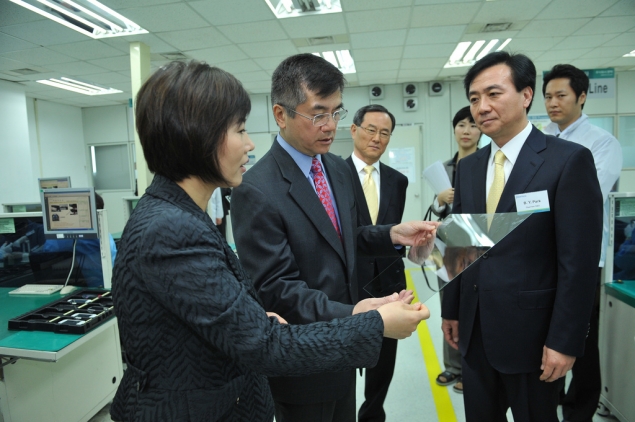On the second day of the CODEL trip to Korea, Secretary Locke and the congressional delegation visited Pantech, one of the largest mobile phone makers in South Korea, to see firsthand how the U.S.-South Korea Trade Agreement will help American and South Korean businesses and workers in today’s global manufacturing and supply chain.
Currently, Pantech imports about half a billion dollars worth of U.S. products annually, including chipsets from Qualcomm (San Diego, Calif.) and Gorilla Glass from Corning Inc. (Corning, New York). Gorilla Glass is manufactured in Harrodsburg, Kentucky and is exported around the world for use in smart phones, tablets and other mobile devices and has applications across a large range of industries. In addition, nearly 60 percent of Pantech’s production equipment is made by U.S. companies.
With the approval and implementation of the U.S.-South Korea agreement, Pantech is expected to quadruple its purchase of U.S. products by 2015, while Corning will see existing tariffs on Gorilla Glass eliminated immediately upon implementation of the agreement. Corning, utilizing these benefits, will gain market share in South Korea’s growing mobile-device market by enhancing its competitiveness vis-à-vis other manufacturers in the region. Corning is also investing $180 million to expand its factory in Harrodsburg in order to meet the growing demands of its customers in Asia, including South Korea. Earlier in the day, Locke met with his South Korean counterpart, the Minister of Knowledge Economy Choi Joong-Kyung, to discuss KORUS and the cooperative relationship between the U.S. Department of Commerce and the Ministry of Knowledge Economy.
At a luncheon hosted by the American Chamber of Commerce in South Korea that followed, Locke delivered the keynote address, stressing the importance and benefits of growing U.S.-South Korea commercial relations through the U.S.-South Korea Trade Agreement (KORUS). Locke is in South Korea leading a bipartisan congressional delegation to demonstrate firsthand how this agreement will support job creation at home and spur economic growth in both the U.S. and South Korea.
“This trade agreement is going to help move forward significant national priorities for America and South Korea, while spurring economic growth and job creation in both countries,” Locke said. “For the United States, implementation of the agreement will help create a level playing field for U.S. businesses and workers, and help increase exports. For South Korea, this is an opportunity to secure preferential access to the U.S. market, lock in this access, and provide its companies with an edge over global competitors.”
Tomorrow, Locke and the delegation will visit the Demilitarized Zone -- the border between South Korea and North Korea. They will also have lunch with U.S. troops and their families, as well as the United Nations Command. The group will also meet with leaders of South Korea’s Democratic Party and Grand National Party, as well as the National Assembly Committee on Unification, Foreign Affairs, and Trade.
See
text of Secretary Locke’s remarks,
guest blog post by Amy Jackson, president of the American Chamber of Commerce
in South Korea, and updated photos
from today’s events.








Comments Closed
Due to increased spam, comments have been closed on this content. If you wish to comment about the content, we encourage you to email webmaster@doc.gov.